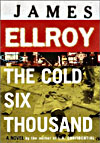
Comment
on this story
|
 |

James Ellroy's second Underworld USA installment celebrates the nasty characters who shaped modern society
by Paul Lewis
James Ellroy, best known to most of us as the writer of L.A. Confidential, lets you know exactly what you're in for with the first sentence of his new epic of dark historical fiction, The Cold Six Thousand:
"They sent him to Dallas to kill a nigger pimp named Wendell Durfee."
In interviews Ellroy has called that attention-grabber a "warning," a notice that the words you're reading are as incendiary as the time-frame The Cold Six Thousand (Alfred A. Knopf, $25.95) represents, America in the throes of 1963-1968. It's all contained and explained: The JFK aftermath, Howard Hughes in Las Vegas, the undercurrents of organized crime, the civil rights movement, Vietnam, and the deaths of MLK and RFK. Rather than tell this story from the side of "the law," however, it's told from the bottom—from the perspective of the legbreakers, button men, mob lawyers, compromised government agents, and corrupt cops who turned the gears bigger men greased. The result is not a noir or a crime novel per se, though it takes those elements into a new, more complex arena.

It's the same tack as American Tabloid, Ellroy's 1995 epic which covered 1958 to Dallas, 1963, and stars the same characters—at least the ones who make it out of '63 alive. Tabloid should be required reading before attempting The Cold Six Thousand, as the thickness of the plots, machinations, and set-ups which play out in the former take Ellroy roughly 100 pages to break down in the latter, all while introducing new protagonist Wayne Tedrow, Jr., a Las Vegas Mormon cop paid $6,000 to snuff the pimp mentioned in the book's first sentence, who arrives in Dallas moments after JFK's assassination. Tedrow, like all of Ellroy's best characters, is flawed to the nth degree, nursing simmering feelings of racial hatred and harboring a precarious mix of need and loathing for his well-to-do (and white collar criminal) father.
Tedrow is taken under wing by Pete Bondurant, mob-beholden French-Canadian hulk and all-purpose fixer who had formerly scored drugs for Howard Hughes and run Cuban exile training camps pre-Bay of Pigs. Bondurant is an Ellroy novelty—a happily married, willful man who struggles with the impact "The Life" has on him. Bondurant works with/for dirty lawyer Ward Littell, a heavily conflicted former seminarian and disgraced FBI wiretap man who cannot purge his liberal leanings, nor free himself from the glare of J. Edgar Hoover, setting in motion a good portion of the book's spiritual, rather than obvious physical, conflict.
The recent historical epoch, and the creepy feeling that this could all be true, keeps a reader flipping through Ellroy's oft-frustrating staccato prose gunshots. Ellroy is a literary stylist of the highest order, a writer with a distinctly cynical worldview whose sheer force of will pushes one through a complex globe of shifting loyalties and undone deals. The Cold Six Thousand is so epic in scope, so quick to introduce and resolve and build on plot points, that 30 of its pages would be the basis of 300 in most other noir novels. Important caveats are dropped in the midst of curt descriptive passages, forcing close examination and rewarding longer attention spans. This will endear or infuriate a reader.
It takes a lot of chutzpah to attempt a work as dense as this and even more to sell it as literature with a capital "L" to anyone other than conspiracy enthusiasts. Ellroy, affectionately known as "Demon Dog" to fans, succeeds far more often than he fails. Despite its enormity, the book's plot is fairly tight, each character's motivation fully realized, each foreshadowing paid off. Much like on television's The Sopranos, the protagonists lead horrible lives, kill or pull strings on command, and have deep fissures in their emotional lives. Also like the show, Ellroy enables the reader to like these characters, or at least understand their decisions, and pull for them to make it through to the end.
The Cold Six Thousand is also a book of unforgiving, intense violence and racial invective, flying in the face of politically correct notions that re-wording the problem solves the problem. The violence does not always have consequences, the guilty go unpunished, and the good guys lose. It may not be typical narrative, but it's dizzyingly fun in its machismo, and, more to the point, honest about the time frame it represents.
Ellroy promises a final book in this "Underworld USA" trilogy, one that will surely leave unturned none of the numerous stones along the byways of America circa 1968-1972, including the final days of Hoffa, the Nixon presidency, and Watergate. If we're lucky, it will be as bleak, honest, and unforgiving as his best work, which The Cold Six Thousand will rank among.

August 9, 2001 * Vol. 11, No. 32
© 2001 Metro Pulse
|